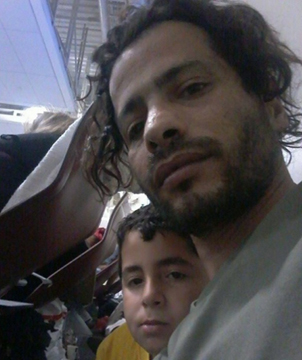Nowhere else to go
by Patrick Kingsley
Life imitates art as
Palestinian-Syrian father and son are trapped in Terminal 2 of the Dubai
airport for two weeks
|

Wael al-Sahlee and his son Montasser, who spent a fortnight
in Dubai airport Photograph: Facebook |
His recent life evokes the plot of The Terminal, in which Tom Hanks
plays a fictional refugee trapped in an American airport after being
refused a visa. But the experiences of Wael al-Sahlee are all too real:
until finally being deported last Thursday (May 14) evening, the
41-year-old Palestinian-Syrian refugee and his nine-year-old son,
Montasser, were stuck in Dubai airport for a fortnight.
While Hanks’s character finds a room where he can sleep in privacy,
the Sahlees had no such luck. Their home was on the floor behind a row
of seats next to the Fly Dubai offices at gate 12 of terminal two. There
were some nearby loungers to sleep on, but there was always competition
for them, and Sahlee did not want the hassle.
“It’s an ugly experience,” Sahlee said by phone, shortly before
various governments and UN officials finally agreed on where he could go
next.
“I’m looking at people going to the duty free and going on holiday,
while my son is sitting there doing nothing,” he added, in a
conversation frequently interrupted by the public address system of one
of the world’s busiest airports. “And he’s watching other children have
fun at a time when he’s imprisoned.”
From Yarmouk refugee camp
The roots of Sahlee’s predicament go back a long way. A sculptor and
activist, he grew up in Yarmouk in Syria, a refugee camp for the
families of Palestinians who fled the 1948 Arab-Israeli war. During the
Syrian civil war, Yarmouk became caught up in the fighting, and Sahlee
and his wife, Nisrene, began to use their home to treat the wounded. For
his efforts, Sahlee was arrested, and some of his friends were tortured
to death. So on his release in late 2012, he and his family fled to
Jordan, which soon closed its border to Palestinians for fear of
diluting the Jordanian population.
Life was hard in Jordan. Like many Palestinians, Sahlee was not
allowed to work, and so endured more than two years of purgatory.
Eventually his family decided the only chance of a stable future would
be for him and Montasser to take a smugglers’ boat to Europe from Libya.
Nisrene explained: “If we had enough money we would have all gone – we
had the idea that if we died, at least we could have died altogether.
But we only had enough money for them.”
As a result, on 30 April, Sahlee left his wife and two daughters for
Sudan, flying with Montasser via Dubai. The idea was to then pay
smugglers to take them from Sudan to Libya, and then from the Libyan
coast to Italy.
But the problems started in Khartoum, the Sudanese capital. There was
something wrong with their visa application, so they were deported back
to Dubai. In Dubai, the Jordanian authorities said they would not
readmit them – and so too did the Emiratis. Then Turkey, a common
destination for many fleeing Syria, would not help them. In limbo at the
airport, the pair were not technically applying from any particular
country.
So they remained in terminal two for two weeks – until finally on
Thursday, after several calls from several rights groups and media
organisations, the Emiratis put Sahlee on a plane back to Jordan. The
reasons were unspecified, and his fate in Amman is unclear.
‘If I go back to Syria I will die’
It is a case that highlights the narrowing choices facing
Palestinian-Syrians seeking to flee the Syrian civil war, according to
Chris Gunness, spokesman for UNRWA, a UN agency that supports
Palestinian refugees. For Syrians escaping the war, the options are
scarce enough. But there are fewer still open to the 520,000 long-term
Palestinian residents of Syria, who in practice are afforded fewer
privileges by Middle Eastern countries.
“It’s a terrible and very painful example of the added
vulnerabilities that Palestinians have,” said Gunness. “The borders into
Jordan and Lebanon have effectively been closed to Palestinians. Other
options involve getting through territory controlled by armed groups –
and if they’re lucky to get through those then their next options are
horrendous: the high seas, where their lives are also at risk.”
For now, Sahlee will not even be able to risk those dangers – foiled
by an airport departure lounge, rather than the Mediterranean.
It could have been worse: Fly Dubai, the airline they used, gave them
three meals a day. Some of the terminal workers – mostly Indians and
Bangladeshis – tried to be kind, giving Montasser chocolates and
biscuits.
But in the bustling airport, neither slept for more than four hours a
day, and they did not have as much as a sheet to keep them warm at
night. Increasingly delirious, they didn’t change clothes since April.
And they never got to have a shower.
There were showers nearby: they could see people constantly going in
and out of the business-class lounges and a hotel inside the terminal
itself. But no one offered them access.
“We are humans,” Sahlee said, when asked to deliver a message to the
world. “It’s not right for us to be treated this way by Arab countries
and Arab airports. I can’t imagine any European sleeping two weeks
behind a row of chairs, or being expelled from all Arab countries. And
it’s not just my problem – it’s a problem of hundreds of thousands of
Waels and Montassers. We have a nation: Palestine. Send us there. We
shouldn’t have to beg a place from other countries.”
(This article with
additional reporting for Manu Abdo was originally published in the
Guardian UK) |

